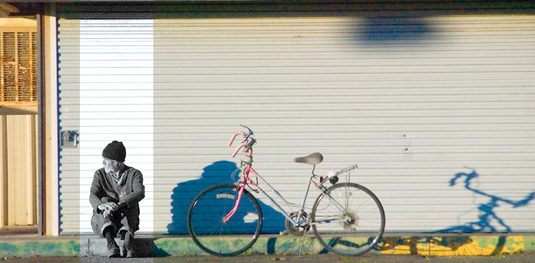
Poverty in the Land of Plenty
Hurricane Katrina revealed the
face of poverty
in the Gulf region. But it shouldn’t take a disaster for Americans to realize that poverty is growing across the nation.
UC Davis researchers
are tackling the problem from
many directions.
By Kathleen Holder
White, brown, black and Asian. Immigrant and native born. Urban and rural. More than one out of every eight people—and more than one out of every six children—in the United States lives in poverty. Many more live on the edge, worrying about how to put food on the table, keep their homes, pay their utility bills and get medical care without health insurance.
While the country as a whole is wealthier, the United States has made little progress against poverty over the past three decades. A census report last fall counted 37 million Americans living below the federal poverty line, defined as some $19,000 in annual income for a family of four. This 12.7 poverty rate—while lower than peaks around 15 percent during recessions in the early 1980s and early 1990s—is about the same as it was in 1970. By comparison, during the 1960s, the country reduced the poverty rate from 22.2 percent.
UC Davis sociologist Fred Block, who has been studying U.S. poverty since the 1980s, said he believes Americans are beginning to ask whether the nation can do better than that.
“We’re beginning to come out of this 25-year experiment with market fundamentalism—a vastly exaggerated belief in the market’s capacity to solve social and economic problems,” Block said. “It hasn’t worked. The economy hasn’t improved. The poverty got worse. The health-care system is in worse shape. There’s a growing sense that there’s a need for an alternative vision. But nobody yet has articulated that vision. Whether anyone will succeed in doing that is unclear. It’s certainly up for grabs what happens next.”
One potential presidential candidate is bringing an anti-poverty campaign to college campuses, urging students to make ending poverty the cause of their generation. In a news conference and speech this winter at the UC Davis Mondavi Center, former Democratic vice presidential candidate John Edwards called poverty the “greatest moral issue facing America today.”
Edwards, who leads the Center on Poverty, Work and Opportunity at the University of North Carolina at Chapel Hill, proposes raising the federal minimum wage, expanding the Earned Income Tax Credit, creating work bonds and housing vouchers and ensuring better access to college. President Bush and other Republicans, on the other hand, back federal tax cuts, less regulation and freer trade to encourage investments, enterprise and job creation.
Findings by UC Davis economists, political scientists and sociologists provide a knowledge base for renewed debate on addressing poverty. Their wide-ranging research captures a number of snapshots of poverty—providing big-picture views of economic and social forces driving poverty rates as well as close-up portraits of the homeless. Other studies examine the results of welfare-to-work reforms and job-training programs.
Edwards said Hurricane Katrina, by revealing poverty so vividly, created a window of opportunity to do something about it. “The question is how long that window will stay open.”
Related stories:
Homelesss—Poorest of the Poor
The homeless, says sociologist Dean MacCannell, are a lot like the rest of us—with dreams of a decent job, good home and a nice vacation. The difference is that “their relationship to the world is broken, usually by a drug or alcohol problem.” [more]
The New Rural Poor
Mention poverty and many people think of the inner cities. But a number of small Central Valley towns have poverty rates rivaling those found of the poorest neighborhoods of Los Angeles and Oakland. [more]
Students Help
Tu Tran Huynh was deeply touched by the homeless children she met as a high-school volunteer at Sacramento’s Loaves and Fishes dining hall. She wanted to do more to help, so as a sophomore at UC Davis she co-founded a student organization to advocate for the local poor. [more]
The Poor Get Poorer
Since 2001, the U.S. economy has been growing and the standard of living going up, but more than 4 million more Americans have slipped into poverty. Three UC Davis economists recently took a closer look at the reasons why and found the answer lies largely in a growing wage gap. [more]
The Compassion Gap
Hurricane Katrina exposed more than the face of poverty in the United States, says sociologist Fred Block. It also revealed a historic schism in American attitudes—a “compassion gap” between traditions of helping and blaming the poor. [more]

Kathleen Holder is associate editor of UC Davis Magazine. Photos by Karin Higgins/UC Davis.
|

